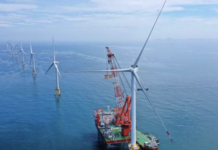
On 11th September, the 2023 China-Malaysia Integrated Smart Zero-Carbon Power Plant Development Forum organised by Shanghai Energy Technology Development Co., Ltd (hereinafter referred to as “SETD”) was successfully held in Kuala Lumpur, Malaysia. The forum was attended and addressed by the Minister of Science, Technology and Innovation of Malaysia Chang Lih Kang, Minister Counsellor of the Economic and Commercial Office of the Embassy of China in Malaysia Sun Shuqiang and Deputy General Manager of Shanghai Energy Technology Development Co. Ltd (SETD) Huang Dongsong besides hundreds of representatives from relevant Malaysian authorities and private enterprises.
At the forum, SETD, which is a subsidiary of China State Power Investment Corporation Ltd. (SPIC), released the research results of ” Malaysia’s Integrated Intelligent Impactless Power Plant (3iPP) Planning and Prospects”. The forum also facilitated exchanges and discussions around the development of China-Malaysia Sino-Nuclear Smart Zero-Carbon Power Plants, and SETD signed a Memorandum of Understanding (MOU) on strategic co-operation with Majuperak Holdings Berhad.
In recent years, due to the impact of the pandemic and frequent occurrence of extreme weather, among other factors, the security of global energy supply has ushered in a serious challenge, and the transformation of clean and low-carbon energy has become a global consensus. Malaysia is in a critical period of infrastructure development and economic transformation, in order to meet the growing demand for electricity. In recent years, it has also begun to work on adjusting the energy structure, broadening the types of energy, expanding coal-fired power generation and renewable energy power generation, and launching a series of investment incentives, including feed-in tariffs, tax incentives, and renewable energy auction policies.
In 2019, Malaysia announced a ten-year blueprint plan for the power sector, the “Malaysia Power Reform 2.0 Programme”, which proposes to gradually open up the power fuel source, generation, transmission, and distribution and retail markets in Peninsular Malaysia. From purchase of power, the plan aims to gradually liberalise Peninsular Malaysia’s electricity fuel sources, generation, transmission, distribution and retail markets, moving away from power purchase agreements and concessions towards capacity and energy markets, and allowing more independent companies to enter the electricity sector. SPIC is one of China’s large state-owned important backbone enterprises, shouldering the important mission of China’s energy supply and livelihood protection, with photovoltaic power generation, wind power, hydropower, nuclear power, coal power and other power supply varieties, is the world’s largest photovoltaic power generation, new energy power generation enterprises and clean energy power generation enterprises. Up to now, SPIC manages 238 million kilowatts of power installed capacity, of which clean energy accounts for nearly 68%, which is ranked 260th in Fortune 500 in 2022. As a second-tier subsidiary of SPIC Group and a wind power industry innovation centre, SETD has total assets of more than 30 billion yuan and manages an installed capacity of more than 4 million kilowatts of electricity, all of which is clean energy. The total capacity of thermal power and new energy is over 80 million kilowatts. In the field of wind power, independent research and development of “wind”, “light by light”, small (micro) wind turbines and other core technologies, has achieved a series of scientific and technological innovation results. SETD entered the Malaysian energy market at the end of 2016 and established Malaysia Energy Company in 2017. After nearly 8 years of development, SETD in Malaysia general contracting construction and production of photovoltaic project capacity of 90 megawatts, a number of clean, efficient and high-quality energy cooperation projects to take root.
At the forum held on the 11th Sept, another new achievement of China-Malaysia cooperation which is – “Malaysia’s Integrated Smart Zero-Carbon Power Plant Planning and Prospect” research results were officially released. Comprehensive intelligent impactless power plant is an important scientific and technological innovation pioneered by SPIC to ensure energy security and green low-carbon development, through coordinated control, intelligent metering and information and communication and other key technologies, to achieve “communication” and “convergence”, the relatively dispersed through coordinated control, intelligent metering and information communication and other key technologies, it realises “communication” and “aggregation”, integrates the relatively dispersed elements of source, network, load and storage through the intelligent system, which is equivalent to the formation of a controllable “intelligent control (mandatory) + controllable load/energy storage/distributed power supply (optional, at least one of which is included)” aggregator, improves the flexibility and reliability of the power system, and supports the construction of a new type of electric power system.
Different from the traditional concept of “power plant”, an integrated smart zero-carbon power plant can be a power plant to the outside world, providing power when the system is short of power; it can also be a power load, consuming energy when there is excess supply; it is also an energy storage station, reserving a certain amount of emergency energy at all times; and while realising all these external functions, it also protects all the users within it. At the same time, it also guarantees the energy dispatch of all its internal users. Compared with the virtual power plants carried out at home and abroad, the State Power Investment Group’s Integrated Intelligent Zero-Carbon Power Plant is a more advanced type of virtual power plant based on a more in-depth expansion of the application, which has an interface with other networks in the era of the Internet of Things (IoT), and can be expanded through the traffic of other networks to expand its business model.
The research on the development and outlook of Malaysia’s Integrated Smart Zero-Carbon Power Plant can not only promote the co-operation between China and Malaysia in the innovative development of science and technology industry, but also a series of scientific and technological innovations can be applied to the development of Malaysia’s green energy transformation, which will contribute to the fight against climate change and the realisation of sustainable development of mankind.


















